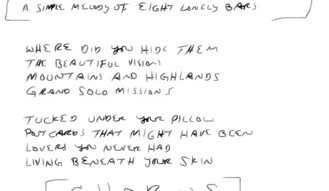The writing of my “Artist’s Statement” and manifesto is not entirely unrelated to the last six or so years of my life being innundated with change. I won’t go into too many details, but moving to Texas, getting married, having two kids, and taking on a pile of responsibility at The Day Job have taken up significant mental space. Being who I am, my reaction to massive amounts of change is to try and take a quick inventory of things that are important. In other words, what can I throw overboard to make sure that what I’m doing that is important gets its due? Writing helps that along.
I’ve been keeping a rather extensive daily journal for years. Now and again I will leaf through an older volume, wince a little, and try to pick out themes. I’ve done those sorts of meta-reviews for a long time. To make that simpler, I now keep a pocket notebook with the title “Daily Accounts.” This is a nod to the agricultural notebook in which the information finds a home. It’s also a way to remind myself that this is a book that tracks details; just a few bullet points per day. Looking back over my pile of them I can track my reading habits, when I’m doing good studio work, the ordering of instrument supplies, and other details that would otherwise slip through the cracks. I know what I was working on and when. I can also weight the relative importance over a period of time and note patterns. A great pattern to note is that I do absolutely nothing of any worth between June and August since my move to Texas. I can correlate that with the average ambient temperature and humidity and figure that, perhaps, temperatures in the 100+F range are not conducive to my work. Or moving.
During one of my little sessions with my notebooks, it occurred to me that I really needed to take stock of where I stand with my creative work. At the end of last year I had about four musical projects in various states of incompletion. Nothing was moving. My sketches were getting sparse and I needed to reset a few things. Digging through older journals, I saw that my focus had shifted heavily over the past few years. My experimentation with electronic/computer music was all but gone from my regular routine. I wasn’t working on chamber music anymore. In fact, if it didn’t involve an acoustic guitar, I wasn’t doing it. There’s nothing wrong with any of this, I simply hadn’t realized that my scope had narrowed itself so dramatically.
I sat down and made a list. I wrote down all of the pieces I would like to write. Then I reviewed the list and determined which ones I wanted to write that night. That was enlightening. It’s like making a list of movies on the Netflix queue. All of the cool art films get put on there when making the list but the only thing that actually gets watchedn on a quiet Friday night is the complete Kids In The Hall collection. Our better angels make those lists and then bug out when it’s time to produce. At least mine do. I started to give some real thought about what I want on my Done pile when I’m really done. Getting there won’t be easy.
Writing out what’s important to me as an artist and defining my direction is really important right now. I am finally starting to understand the laser-like focus that is required of someone who leads a double life. There are more than a few sacrifices and to make good decisions there have to be good guidelines. There has to be a plan.
My statement is my plan.
The exercise of writing it is more important than the final document. I see that now very clearly. And every weekend I get out of bed before the kids are stirring and I sit down and write more. The more I write, the more I really understand what I’m doing is carefully examining what stays on the boat. Knowing what has to stay makes tossing the other stuff easier.
